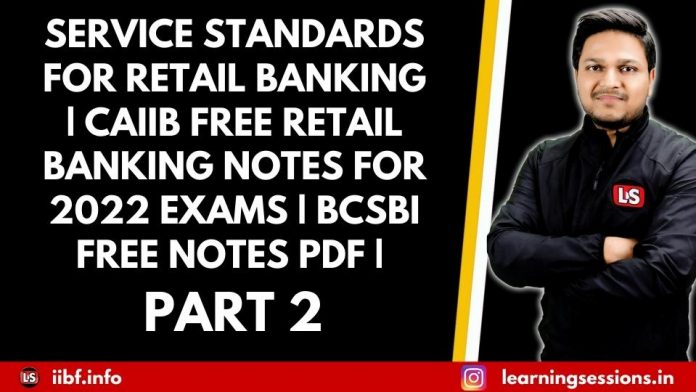SERVICE STANDARDS FOR RETAIL BANKING | CAIIB FREE RETAIL BANKING NOTES FOR 2022 EXAMS | BCSBI FREE NOTES PDF | PART 2
As we know that IIBF conducts the CAIIB exams twice a year & they are considered to be the most difficult ones for bankers to get cleared. We assure you that our ‘CAIIB Study Material’ will definitely help you clear your CAIIB exam for June 2022 attempt. If you have passed JAIIB 2022 then you are eligible to write CAIIB Exam 2022.
This article is the continuation of the last article which was on the Code & the issues which have been raised by the member banks of BCSBI in relation to the Code itself. This article will only take a few minutes to read and you will have all the concepts refreshed!
CODES
As already stated, BCSBI in collaboration with the IBA has brought up 2 codes:
- Code of Bank’s Commitment to Customers
- Code of Bank’s Commitment to MSEs (Micro & Small Enterprises)
These codes are voluntarily to adopt by the member banks.
| Sl. No. | Para of the Code | Issues Raised by Member Banks | BCSBI Clarifications |
| 8 | Collection of dues-
On request – details of the recovery agency firms or companies at bank branches. |
Banks wanted to amend the provision to ‘these details are available on the bank’s website & can be obtained by written request to the Bank’s Nodal officer.’ | The bank have to put the details of recovery agents on their websites & if a customer requests for the same, it can be provided to the customer at the branch. |
| 9 | Statements of Savings or Current Accounts
i.e unless Customer opt for pass book, bank will provide monthly statement of accounts. |
Banks wanted the freedom to decide about the periodicity of sending physical statements (hard copies) to customers. However, customers can also collect monthly statements free of cost from the branches. | As per RBI regulations banks have to issue monthly account statements, free of cost to those who have opted for account statements. |
| 10 | Brief & intelligible entries in Savings or Current Accounts Statements
|
Banks wanted that the name of the payee of a cheque (debit entries) need not be entered because customer is expected to know/keep a record of the cheques issued by him/her; &
The existing banking systems do not allow such entries |
Because entries are the most fraud-prone area & the source of complaints, its considered imperative that member banks should modify their procedures & systems so that the name of the payee in the pass book or statements of account, as the case maybe, entered. |
| 11 | Term Deposit –
When customers deposit money for fixed term, banks are liable to obtain Form 15H or 15G at the time of application if he/she is not liable to pay tax on their interest income. |
Banks wanted this liability to be shifted to customer, where they will only accept the Form 15H / 15G at the time of application.
And in case of the FDs booked through Internet banking or phone banking, customer should visit the branch for submission of Form 15H or 15G |
The bank is committed to explain the IT rules and obtain Form 15G /15H, at the time of placement of Term Deposit.
And in case of internet banking, if bank can accept the FD through e-media, then it can also accept these forms through internet. |
| 12 | Customers are required to be notified if their accounts turn Dormant or Inoperative accounts | Bank is unable to notify the joint account holders before their A/c is classified as dormant, when bank only have the address of the 1st joint account holder or when the both parties’ addresses are different.
It’s practically impossible to notify the account holders 3 months in advance as bank can’t really classify before the account actually gets inoperative or unclaimed. |
It is important to notify the joint account holder/s as the joint account holder/s & a/c opening form should have the provision of address of all joint holders & system should be modified to capture all addresses.
The account holders must be advised that their a/c will be classified as dormant if it remains inoperative for 1 year & 9 months. i.e. 3 months before the account is classified as dormant or inoperative can be duly notified. |
| 13 | Bank is required to compensate as per their Cheque Collection or Compensation policy if there is any delay in collection of instruments, without waiting for a demand. | In regard to collection of cheques there is no liability fixed on the paying bank for delay, if any, but it should be set for delays at the paying bank and such amount should be remitted voluntarily.
And just because an account has been rendered inoperative, in case of ‘Anywhere banking’ – cheques drawn on a dormant account might get presented at another centre where the non-home branch might not be able to contact the customer & it will be difficult for them to honour the cheque which may cause inconvenience to the customer. |
The person who deposits a cheque for collection from another bank is a ‘customer’ of the collecting bank & therefore, in case of any delay, be paid by the collecting bank because it the collecting bank which has a relationship with customer.
In the CBS environment, banks should keep all details of accounts including phone number(s) of their customer(s) up-to-date so that this data can be accessed by any branch of bank. |
| SYLLABUS | STUDY MATERIAL | NOTES | MOCK TESTS |
| CAIIB Advanced Bank Management Syllabus 2022 | CAIIB ABM Study Material PDF 2022 | CAIIB ABM Notes PDF 2022 | CAIIB ABM Mock Test PDF 2022 |
Also Like:





